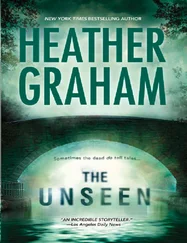They did not go to New York that year for Christmas, nor did they have a Christmas tree. The possibility crossed Ada’s mind that David hadn’t even gotten her a present, until, late on Christmas night, she shyly produced hers for him — it was a rare early edition of The Castle of Otranto , a bizarre favorite of David’s that she had found in an antique shop nearly a year ago and had been saving ever since — and he sprang to his feet. From upstairs he produced a wrapped present for her. When she opened it she saw that it was a sparkly, spangled sweater, and she knew, with certainty, that it was Liston, not David, who had chosen it, bought it, and wrapped it.
By late January she had stopped leaving him alone. Liston, without being asked, began to pick him up in the morning, so that they could travel to the lab together. Ada kept herself awake at night, listening for footsteps descending the stairs, waiting for him to make a noise that would rouse her. She grew weary with fatigue. She grew tired of pretending, to the rest of the lab, that everything was all right.
She hung the front door and the kitchen door with a dozen decorative jingle bells that she’d purchased on sale after Christmas at a nearby store. She rigged up a system that would drop a hammer on a pot when either door was opened, and rested slightly easier. Twice, her makeshift alarm system sounded in the night, and she bolted from her bed and chased after him, down Shawmut Way, guiding him back to his bedroom gently, telling him he was sleepwalking. He was worse at night, or whenever he was tired, less lucid, nearly incapable of intelligent conversation. He called her Mother once. Once, he grabbed her by the wrist and placed her hand on his forehead, as if to tell her he had a fever, wordlessly, plaintively. It frightened Ada. He forgot her name completely on several occasions, and regularly forgot the names of his colleagues. That one , he said, or You know the one . When the DCF agent stopped by, Ada prepped David, subtly, in advance, walking him through the questions Miss O’Brien would ask him by asking him them herself. By the end of their visits he was tired, cantankerous, unlikable. And Ada would do her best to cheerfully distract Miss O’Brien.
Despite all this, he protested that everything was fine.
“I’m perfectly all right, Ada,” he said, in response to any line of questioning about his memory or emotional state. “Really, I’d be much better if everyone would stop haranguing me constantly.”
For months and months, Ada tried to make herself believe that this was true. But at last, in March, shortly after she turned fourteen, Ada walked into his office at the lab. He was staring down at some paperwork on his desk, but he did not seem to be processing it. When she entered he looked up at her, blinking. “Who’s this one, now?” he said.
She knew then that she could not pretend any longer. She walked resolutely down the hall to Liston’s office, and knocked on her door, and felt her face crumple. It was all she could do to keep from crying. She hated crying: it felt to her like a failure of will, a hot and humiliating display of weakness. David did not like it when she cried, and she had never once seen him do it. Miraculously, she held in her tears.
Liston beckoned Ada toward her and pointed to a seat.
“I’m sorry,” Ada said. Her throat was tight. She hiccupped.
“He needs to see another doctor,” said Ada, though she knew, even then, that there was nothing to be done. The disease was rolling in unstoppably, a powerful foreign front, advancing.
Liston convinced David to make her his executor shortly after that, when it became clear that the home visits by social services were going badly. Her childhood friend Tom Meara, who worked for the DCF, had warned her.
Ada, who had become masterful at eavesdropping in the last year, stood in the upstairs hallway of David’s house, the receiver of a telephone extension pressed to her ear, the mouthpiece upended in the air. She breathed as lightly as she could, listening as her father and Liston negotiated her fate.
“They’ll take Ada away from you,” she heard Liston say. “Don’t think they won’t.”
“Really, Liston,” said David, protesting. But in his voice Ada heard something resigned and anxious.
“It would be best for Ada, David,” said Liston. “Right? I mean, wouldn’t it?” And it was then that Ada put the receiver gently down on the table, not wanting to hear anything more. She did not know whom to trust.
Only later did Ada learn all of the details of their arrangement. Mercifully, that year they attempted to keep her protected from whatever backroom dealings in which the two of them were engaging. Even David, never one to shelter her from the affairs of grown-ups, undertook to baby her just a bit, given the circumstances. Or perhaps, more likely, he simply forgot to tell her. But over the course of the following months, it became clear that Liston and David had agreed — whether it was Liston’s idea or David’s, Ada was never certain — that Liston would be designated Ada’s legal guardian in the event that her father became unable to care for her.
On April 1, 1985, David resigned from the Steiner Lab. He did not tell Ada he had done so; she found out only when a grad student let her know that she would really, really miss her father.
“He’s just a great guy,” said the student earnestly. “A classic. There’s not many like him anymore.”
A week later, they received an invitation to a retirement party, formally worded, to be held in a ballroom at the Bit. President McCarren was listed as the host — a fact that made David, even in his somewhat incapacitated state, scoff. Peter McCarren, who had replaced President Pearse several years prior, was despised by David for reasons Ada never fully understood. McCarren was a short, rough man, quite unlike his stately predecessor. He was pushy and red-faced, a bulldog, good at fundraising but bad at math. “That idiot,” David said, anytime his name was raised.
“Good old McCarren,” he said now, ruefully, more slowly than he might have before. “He probably couldn’t wait to see me go.”
The dinner itself was on a Friday night, David’s last official day of work. Ada was to meet him at the lab that afternoon, after her school day ended. In the morning, David had come downstairs in an unironed button-down shirt, and Ada pleaded with him to go back upstairs and put on a suit. She herself ran home briefly after school to change out of her school uniform and into a dress that was slightly too small for her, a pretty one that Liston had helped her pick out the summer before, on one of the shopping trips she sometimes orchestrated for Ada, to David’s mild disgust. The dress, made of light yellow cotton, was too summery for April, and to compensate Ada had paired it with black tights, black patent-leather shoes, and a blue ski parka — her only winter jacket. She had hoped to do without it, but it was still cold that April, and it would not warm up for a month. She looked odd, even she knew it, but she had few other options. She ran to the T through a chilly rain. Inside, she produced the piece of paper she had been carrying in her pocket all day.
This was her secret: at Liston’s urging, she had composed a speech in her father’s honor, a description of his career, the awards he’d won, the impact he’d had on his field. She had stayed up late every night that week, working in her bedroom with one light on, neglecting the homework her teachers at Queen of Angels had assigned her. My father, David Sibelius , it began, is retiring after nearly 30 years of running the Steiner Laboratory . She had crafted it carefully to emphasize his great accomplishments, the nobility of his character, while keeping it relatively restrained and dignified. She had tried to make it funny. If there was one thing David hated, she knew, it was sentimentality.
Читать дальше












